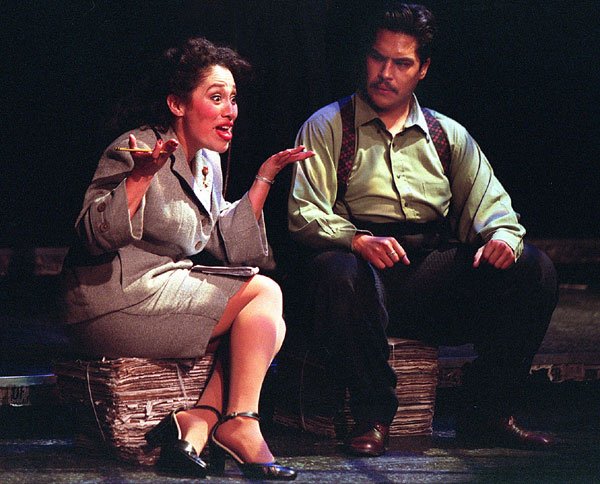SAN JUAN BAUTISTA
– Internationally acclaimed El Teatro Campesino refers to
itself, and the many changes it’s undergoing, as a serpent crawling
out of its own skin. The analogy works because the changes are only
on the surface, and beneath it, the theater remains faithful to its
unique mission and history.
SAN JUAN BAUTISTA – Internationally acclaimed El Teatro Campesino refers to itself, and the many changes it’s undergoing, as a serpent crawling out of its own skin. The analogy works because the changes are only on the surface, and beneath it, the theater remains faithful to its unique mission and history.
Luis Valdez founded El Teatro in 1965 – the first Chicano theater in the United States – and made San Juan Bautista its permanent home six years later. It was an unlikely location for a professional theater, however, the rural town – far from being an urban Mecca – is perfectly situated near highways 101, 129, 152 and 156.
“We’re boxed in by freeways,” said Valdez, who chose San Juan to be close to the farm workers who were the actors in his company. They worked to raise awareness of the farm workers’ causes and later evolved into supporting the entire Chicano movement.
Over the years, those roads have been the arteries pumping cars and tour busses full of theatergoers from all over the state into the sleepy, mission town, which hadn’t seen so much traffic since horse-and-buggy times.
The Teatro itself is also at a crossroads. Valdez, 63, is turning over the reins of the “mom-and-pop” style theater to the next generation of the Teatro – his sons Lakin, Anahuac and Kinan and Estrella Esparza, the daughter of Luis’ long-time partner Phil Esparza. Luis still acts as the artistic director and his wife, Lupe, 58, is the administrative director and – like all family members – occasionally appears on stage.
“Our tenure here in San Juan Bautista is stronger than ever,” Luis said. “It helps that this whole new generation grew up here, went to school here. It’s home.”
Produced for the first time in San Juan, “Zoot Suit” wrapped up its third extended run March 30, featuring the newest generation of the Teatro: Anahuac, 32, as the producer, Kinan, 30, as the director and Lakin, 25, as assistant director. All three, as well as Estrella, 26, filled leading roles in the play, which had a successful run in 1978 at the Mark Taper Forum in Los Angeles and provided the funds for the company to convert an old packing shed into its playhouse, located at 705 Fourth St., in San Juan.
Ironically, Lakin was born on the same day his father finished the rough draft of “Zoot Suit.” Lupe, who was two-weeks overdue, kept telling her husband to hurry up and finish the play, Luis joked. His fate sealed, Lakin was born into a theater family.
“In theater families where everybody works, everybody assumes you act. Everybody can act. You just act,” said Milt Commons, who stage managed “Zoot Suit” at the Mark Taper Forum and has returned to stage manage 12 of El Teatro’s Christmas shows.
Growing up in and around the playhouse, the Valdez brothers dreamt of doing little else besides being on stage – performing. They learned the theater’s unique style of acting called “teatro Chicano” that resembles the type presented by vaudeville companies or tent shows once touring the Southwest. While hanging around backstage, the kids would memorize adult actors’ lines.
“We always knew that we were going to be doing this, except for the small time that I wanted to be an astronaut,” Kinan said.
“Or a doctor” or “a fireman,” Lakin and Anahuac quipped. The brothers have a habit of finishing each others’ sentences. “But, we’re satisfied playing those things on the stage,” Kinan said.
Meanwhile, Luis, had the opportunity to pursue a career as a Hollywood filmmaker after he wrote and directed “La Bamba,” but decided to stay in San Juan to be with his family.
“He chose to stay here and be an artist from a rural community,” Kinan said.
Luis said he chose to invest in the Teatro, its mission and the community in which both are so inextricably linked. Now, as the next generation steps in, the Teatro is firmly rooted in San Juan and its mission won’t change – only the way it gets delivered.
“Our relationship to the past only makes sense if you continue going forward. If we were to stop, then the Teatro and all the stuff in it would become museum work,” Lakin said.
In addition to the theater, Anahuac and Kinan co-manage an independent film company called “Chicanos on the Run” and recently produced the award-winning “Ballad of a Soldier,” based on a one-act play by their father. The talented duo hopes to do more independent film production.
Despite having their own creative projects, the brothers say nothing is as fulfilling as the work they accomplish together. Each wears several hats in the Teatro and pours enormous amounts of time into ensuring its survival for future generations, although all three are single with no children.
“That’s what we share,” Lakin said of the entire Teatro family. “The commitment to continue, to keep this place alive. That’s been the struggle.”
As many arts organizations suffer from reduced government funding, El Teatro Campesino finds itself well positioned. It depends on ticket sales for almost 100 percent of its funding and keeps overhead expenses low thanks to the help of more than a dozen volunteers. With the recent box-office success of “Zoot Suit” and its national tour in the works, the theater’s outlook is especially good.
“There’s still a lot of hope,” Lakin said. “There’s still a lot of room for growth. There’s definitely going to be a lot growth happening in the next few years, I mean, we’re all ambitious. Yes, things look very bright for the future. And I know things will only get better for this company.”
For more information on El Teatro Campesino, visit its Web site at www.elteatrocampesino.com














